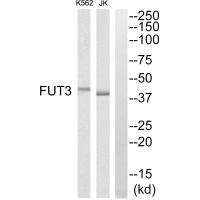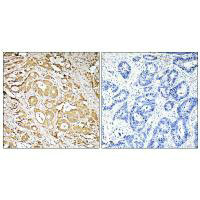FUT3 Antibody
-
货号:CSB-PA040198
-
规格:¥2024
-
图片:
-
其他:
产品详情
-
产品名称:Rabbit anti-Homo sapiens (Human) FUT3 Polyclonal antibody
-
Uniprot No.:P21217
-
基因名:
-
别名:FUT3; FT3B; LE; 3-galactosyl-N-acetylglucosaminide 4-alpha-L-fucosyltransferase FUT3; Alpha-3-fucosyltransferase FUT3; Blood group Lewis alpha-4-fucosyltransferase; Lewis FT; Fucosyltransferase 3; Fucosyltransferase III; FucT-III
-
宿主:Rabbit
-
反应种属:Human
-
免疫原:Synthesized peptide derived from internal of Human FUT3.
-
免疫原种属:Homo sapiens (Human)
-
克隆类型:Polyclonal
-
纯化方式:The antibody was affinity-purified from rabbit antiserum by affinity-chromatography using epitope-specific immunogen.
-
浓度:It differs from different batches. Please contact us to confirm it.
-
产品提供形式:Liquid
-
应用范围:ELISA,WB,IHC
-
推荐稀释比:
Application Recommended Dilution WB 1:500-1:3000 IHC 1:50-1:100 -
Protocols:
-
储存条件:Upon receipt, store at -20°C or -80°C. Avoid repeated freeze.
-
货期:Basically, we can dispatch the products out in 1-3 working days after receiving your orders. Delivery time maybe differs from different purchasing way or location, please kindly consult your local distributors for specific delivery time.
相关产品
靶点详情
-
功能:Catalyzes the transfer of L-fucose, from a guanosine diphosphate-beta-L-fucose, to both the subterminal N-acetyl glucosamine (GlcNAc) of type 1 chain (beta-D-Gal-(1->3)-beta-D-GlcNAc) glycolipids and oligosaccharides via an alpha(1,4) linkage, and the subterminal glucose (Glc) or GlcNAc of type 2 chain (beta-D-Gal-(1->4)-beta-D-GlcNAc) oligosaccharides via an alpha(1,3) linkage, independently of the presence of terminal alpha-L-fucosyl-(1,2) moieties on the terminal galactose of these acceptors and participates in the blood groups Lewis determination and expression of Lewis a (Le(a)), lewis b (Le(b)), Lewis x/SSEA-1 (Le(x)) and lewis y (Le(y)) antigens. Also catalyzes the transfer of L-fucose to subterminal GlcNAc of sialyl- and disialyl-lactotetraosylceramide to produce sialyl Lewis a (sLe(a)) and disialyl Lewis a via an alpha(1,4) linkage and therefore may regulate cell surface sialyl Lewis a expression and consequently regulates adhesive properties to E-selectin, cell proliferation and migration. Catalyzes the transfer of an L-fucose to 3'-sialyl-N-acetyllactosamine by an alpha(1,3) linkage, which allows the formation of sialyl-Lewis x structure and therefore may regulate the sialyl-Lewis x surface antigen expression and consequently adhesive properties to E-selectin. Prefers type 1 chain over type 2 acceptors. Type 1 tetrasaccharide is a better acceptor than type 1 disaccharide suggesting that a beta anomeric configuration of GlcNAc in the substrate is preferred. Lewis-positive (Le(+)) individuals have an active enzyme while Lewis-negative (Le(-)) individuals have an inactive enzyme.
-
基因功能参考文献:
- High FUT3 expression is associated with breast cancer. PMID: 26908442
- the high expressions of BCL6 and Lewis y antigen are associated with development, high tumor burden, and worse prognosis of ovarian cancer and targeting BCL6 could be a novel therapeutic strategy for ovarian cancer treatment. PMID: 28671040
- the miRNA expression vector which targets the FUT3 gene can effectively inhibit the proliferation, migration and invasion abilities of KATO-III cells. PMID: 27453266
- Polymorphisms in FUT3 and its intestinal expression might be associated with ulcerative colitis pathogenesis. PMID: 26766790
- Data suggest that fucosyltransferase 3 (FUT3) gene rs28362459 and rs3745635 single nucleotide polymorphisms (SNPs) may engender the increased risk of ileocolonic and ileal Crohn's disease (CD). PMID: 26663064
- that the absence of alpha1,3/4-fucosyltransferase enzyme is related to breast's invasive breast carcinoma PMID: 26321244
- Mutations of FUT3 (rs28362459) and (rs3745635) might influence the lesion locations in CD patients. PMID: 24720527
- Obtained FST values reveal distinct frequencies of the FUT3 SNPs between the present sample and its representative ancestral populations. PMID: 23922852
- down-regulation of FUT3 and FUT5 reduces the expression of sialyl-Lewis antigens and the adhesion capacities of gastric cancer cells and allows to identify the specific alpha1-3,4 fucosyltransferases implicated in the Lewis antigens synthesis PMID: 21978830
- Elevated expression of Topo-I and Topo-II beta is found in Lewis(y) antigen-overexpressing ovarian cancer cells. PMID: 21542140
- LeY is carried by integrin alphavbeta3 and plays a critical role in attachment to cultured cells. LeY activates integrin alphavbeta3/focal adhesion kinase (FAK) signaling. PMID: 20605574
- At physiological levels of wall shear stress, the number of flowing cancer cells recruited to the microtube surface was dramatically reduced by FUT3 knockdown PMID: 20833389
- Lewis-negative genotype was associated with invasive ductal breast carcinoma but not with anatomoclinical parameters PMID: 20514537
- GALNT14 and FUT3/6 H-scores were significantly higher in non-small cell lung cancer cell lines sensitive to dulanermin and drozitumab versus resistant cell lines PMID: 20179215
- Increased expression of Lewis y antigen plays an important role in promoting cell proliferation through activating PI3K/Akt signaling pathway in ovarian carcinoma-derived RMG-I cells. PMID: 20003467
- PCR using sequence-specific primers DNA enables efficient genotyping of clinical samples PMID: 11668626
- Sialy Lewis-X antigens play an important role liver metastases of colon carcinoma. PMID: 11819805
- Distribution of Lewis (FUT3)genotype and allele frequencies by ethnicity in a United States population. PMID: 12424536
- Cys, Gln, and Tyr residues are important for FT3wt sorting into the transport vesicles possibly due to interactions with other membrane proteins PMID: 12493760
- study of the Lewis gene polymorphisms in a Caucasian Portuguese population with a high rate of H. pylori infection, and evaluation of the implications of mutant enzymes in Le(b) expression in the gastric mucosa PMID: 12730721
- results indicated that Mn2+ bound the enzyme and increased its affinity for the acceptor PMID: 14977360
- The heterologous enzyme hFUT3 was strongly expressed and fully functional in transgenic tobacco, which showed a delay in growth linked to a reduction of internode length. PMID: 15331092
- cloning and characterization of the promoter; strong correlation between the promoter activity and high expression of sialyl Le(a) observed in colon carcinoma cell lines seem to confirm the important regulatory role of FUT3 in synthesis of sialyl Le(a) PMID: 16199102
- LeX motif present in human milk can bind to dendritic cell-specific ICAM3-grabbing non-integrin (DC-SIGN), thereby preventing the capture and subsequent transfer of HIV-1 to CD4+ T lymphocytes. PMID: 16239964
- T3 overexpression in gastric cells depends upon promoter hypomethylation and FUT3 is responsible for overexpression of Le(a) in gastric cells, in vitro PMID: 16427187
- functional mutations of the FUT3 gene may be associated with an increased atherothrombotic disease prevalence, especially among abstainers PMID: 17383304
- increased CD15 expression is not due to de novo biosynthesis of CD15, but results predominantly from induction of alpha(2-3)-sialidase activity PMID: 18953356
- Expression of sLex antigen in breast cancer is not associated with breast cancer survival. PMID: 18977761
- These findings indicate that Lewis y antigen have the ability to enhance the proliferation and elevate the survival rates of RMG-I cells, which can promote the genesis and development of ovarian carcinoma PMID: 19137814
- Sequence analysis of FUT3 identified many SNPs, but most of them are in complete linkage disequilibrium with previously reported SNPs responsible for the Lewis-negative phenotype. PMID: 19175549
- results suggested that PKR is the primary target for HSV-1 early RNA during induction of FUT3, FUT5, and FUT6 PMID: 19349624
- in breast cancer there was a limited humoral immune response through Lewis y/IgM/CIC levels detection which correlated with MUC1/IgM/CIC PMID: 19715603
显示更多
收起更多
-
亚细胞定位:Golgi apparatus, Golgi stack membrane; Single-pass type II membrane protein. Note=Membrane-bound form in trans cisternae of Golgi.
-
蛋白家族:Glycosyltransferase 10 family
-
组织特异性:Highly expressed in stomach, colon, small intestine, lung and kidney and to a lesser extent in salivary gland, bladder, uterus and liver.
-
数据库链接:
HGNC: 4014
OMIM: 111100
KEGG: hsa:2525
STRING: 9606.ENSP00000305603
UniGene: Hs.169238
Most popular with customers
-
-
YWHAB Recombinant Monoclonal Antibody
Applications: ELISA, WB, IF, FC
Species Reactivity: Human, Mouse, Rat
-
Phospho-YAP1 (S127) Recombinant Monoclonal Antibody
Applications: ELISA, WB, IHC
Species Reactivity: Human
-
-
-
-
-






















